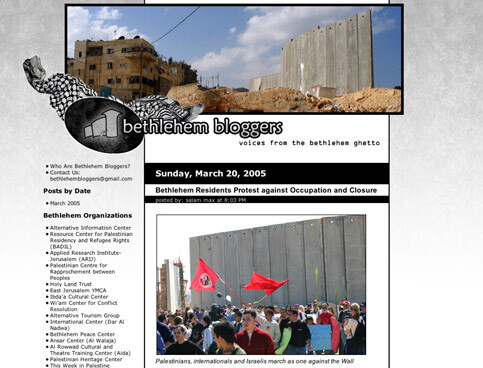The Electronic Intifada 21 March 2005

“A window for you to look in; to see past the walls, barbed wire fences, and the media distortions; to hear from the people in Bethlehem themselves.” Palestinians and internationals living in the Bethlehem region have started a weblog. They want to tell the world what it is like to be living in occupied territory, under an economic siege, encircled by a wall and military checkpoints. For them the new site, Bethlehem bloggers, found at www.bethlehemghetto.blogspot.com, is a portal to communicate to the outside world and tell the stories of their lives in Bethlehem and what it is like to live in a “Palestinian Ghetto.”
The Bethlehem Bloggers website brings first hand insight into life and politics inside Bethlehem. The site is managed by activists and professionals.
In 2002, as Israel launched what it termed “Operation Defensive Shield”, the biggest military operation in the West Bank since 1967, it simultaneously barred foreign journalists from entry to Palestinian towns, villages and refugee camps, creating a news blackout. In response, The Electronic Intifada launched Live from Palestine, an Electronic Intifada Diaries Project featuring continually updated and dramatic accounts from local residents detailing life under a punishing curfew and military invasion.
At that time I was living in ar-Ram, between Ramallah and Jerusalem. I always felt that Palestinians should have a means by which to narrate their own lives, hopes and history. Diaries, and in this age, weblogs, give writers a space in which to record their opinions and reflections on historic and day-to-day events. It has been a valuable asset, an alternative source, and a much needed human context to understand the realities of life under occupation. Weblogs give ordinary Palestinians the power to narrate, address issues of human rights, humane values, justice, and equality.
Bethlehem Bloggers, like thousands worldwide, are changing the terms of media and policy debates through their handmade, personalized blogs. However, these bloggers need permits to pass roadblocks and checkpoints. They need to make a detour to get into their own town. Surrounded by Israel’s Wall on two sides and with many restricted roads and roadblocks, bloggers in Bethlehem live in a prison. The illegal barrier cuts through several kilometers of Bethlehem and it is expected to stretch across more than 420 miles. With one quarter completed, the barrier has already disrupted the lives of thousands of Palestinians who have been cut off from their lands and have been prevented from reaching other villages and population centers.
The main historic street leading into Bethlehem is being completely cut off by Israel’s Wall. The main entrance to Bethlehem is also being cut off, making way for settlements, displacing more Palestinian families and separating others from their olive groves. To a visitor wishing to reach the holy sites in Bethlehem, the concrete barrier erected at the entrance of the city is the most visible manifestation of its physical separation from other towns and villages.
For these bloggers the Wall is the latest of a series of restrictions, including dirt mounds, road gates, checkpoints and roadblocks - known collectively as ‘closure’ – that have been implemented over the past decade and which cut the historical road that connects Jerusalem to Bethlehem and Hebron in the south.
Blogs come in all shapes, sizes, quality and political bent. The best ones are having an impact on global public opinion. “Blogging is changing the media world and could, I think, foment a revolution in how journalism functions in our culture,” former New Republic magazine editor Andrew Sullivan wrote once. He said the personal touch of bloggers is more in tune with current sensibilities than the impersonal, corporate voices of mainstream media.
“Readers increasingly doubt the authority of The Washington Post or National Review,” wrote Sullivan, who has his own highly successful blog. “They know that behind the curtain are fallible writers and editors who are no more inherently trustworthy than a lone blogger who has earned a reader’s respect.” Not everyone is making such sweeping assertions of the power - or potential power - of blogs. But thousands are pouring their hearts into these efforts. What drives most bloggers - and what makes them interesting reading - is the passion and human face behind them.
Weblogging has given Palestinians their own media tools. It prevents ordinary people to solely rely on mainstream media. To Palestinians who have so long been deprived of the opportunity to narrate what it is like to live under the world’s last military occupation, the citizens’ diaries in the form of blogging are a logical outcome.
Related Links
Arjan El Fassed is co-founder of The Electronic Intifada




